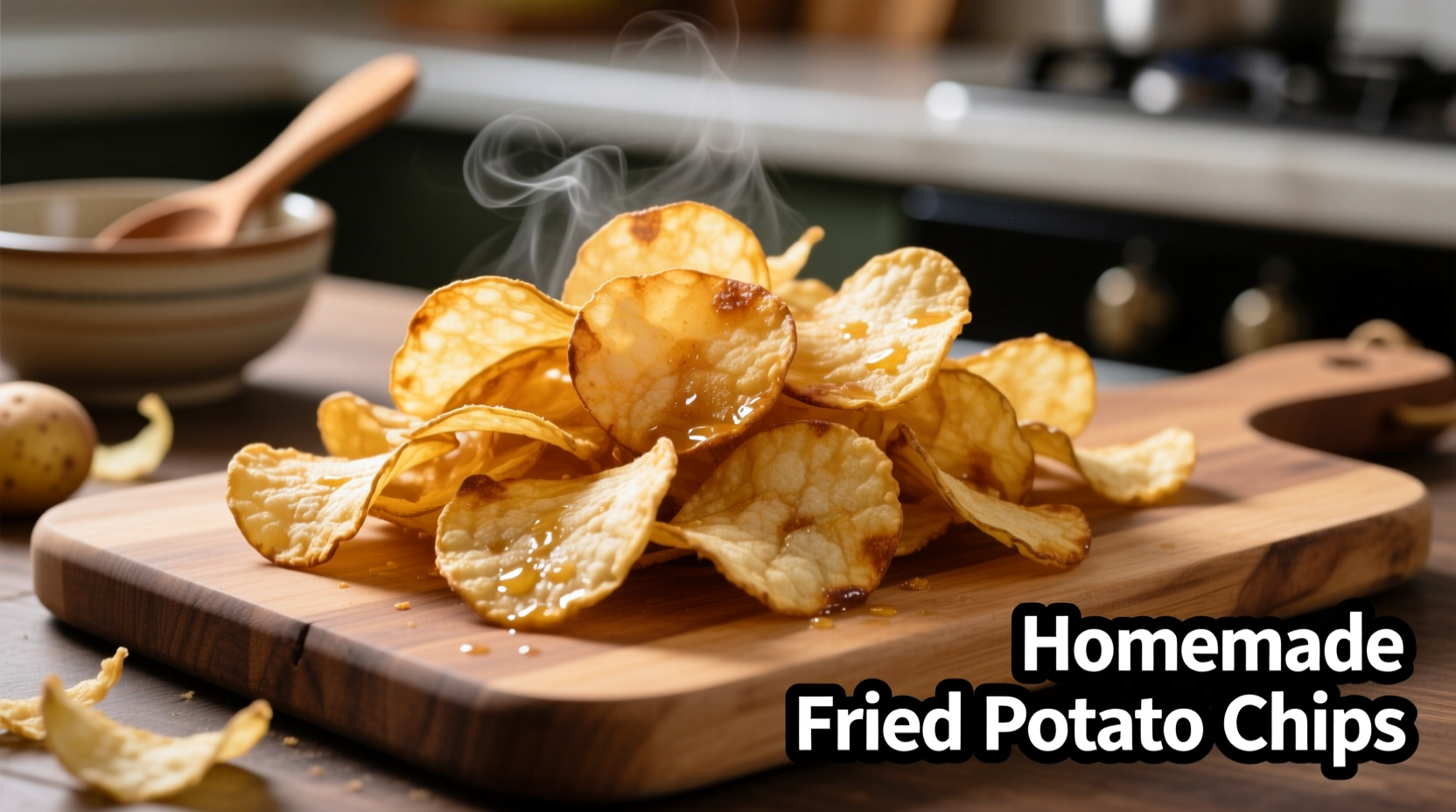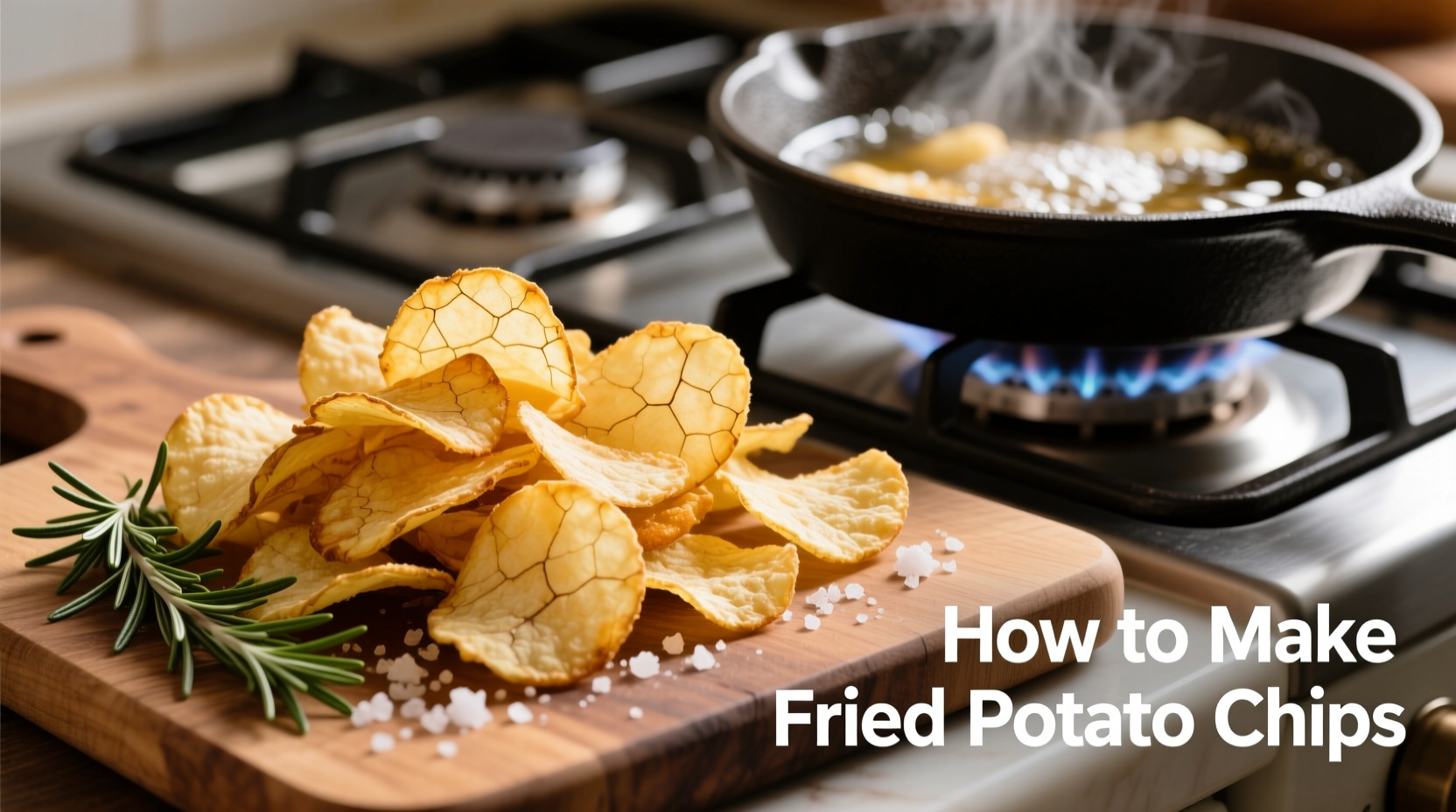There's nothing quite like the satisfying crunch of perfectly made homemade potato chips. Forget the preservatives and excess sodium of store-bought varieties—creating your own fried potato chips gives you complete control over ingredients, texture, and flavor. This guide reveals the professional technique that transforms humble potatoes into golden, crispy perfection every time.
Essential Equipment Checklist
Before you begin, gather these critical tools:
- Mandoline slicer (with 1/16-inch blade setting) - ensures uniform thickness
- Deep heavy-bottomed pot or Dutch oven - maintains stable oil temperature
- Candy/deep-fry thermometer - essential for precise temperature control
- Splatter screen - reduces mess and prevents burns
- Slotted metal spoon or spider strainer - for safe chip removal
According to the USDA Food Safety and Inspection Service, maintaining proper oil temperature between 325-375°F (163-190°C) is critical for food safety and quality. Temperatures below this range lead to greasy chips, while exceeding 375°F risks acrylamide formation (USDA Thermometer Guide).
Potato Selection: The Foundation of Perfect Chips
Not all potatoes create equally crispy chips. The starch content directly impacts your results:
| Potato Variety | Starch Content | Crispiness Result | Best For |
|---|---|---|---|
| Russet (Idaho) | High (20-22%) | ★★★★★ | Classic crispy chips |
| Yukon Gold | Medium (16-18%) | ★★★☆☆ | Thicker kettle-style chips |
| Red Potatoes | Low (14-16%) | ★★☆☆☆ | Not recommended for frying |
Research from the University of Idaho's Potato Quality Group confirms that russet potatoes' higher starch content creates the ideal structure for maximum crispiness when fried properly (Potato Research).
Step-by-Step Frying Process
Preparation Phase (5 minutes)
- Wash 2 large russet potatoes thoroughly under cold water
- Peel potatoes (optional for traditional chips)
- Using mandoline, slice potatoes to 1/16-inch thickness
- Immediately submerge slices in ice water for 30 minutes
The ice water soak serves two critical purposes: it removes excess surface starch that causes chips to stick together, and it firms up the potato structure for cleaner frying. This technique is supported by food science research from the Journal of Food Engineering which shows starch removal significantly improves chip crispness (Journal of Food Engineering).
Frying Phase (15 minutes)
- Heat 2 quarts neutral oil (canola or peanut) to 350°F (175°C) in heavy pot
- Remove 10-15 potato slices from water, pat completely dry with paper towels
- Carefully add slices to hot oil in single layer (don't overcrowd)
- Fry for 2-3 minutes until golden and bubbling slows
- Remove with slotted spoon, drain on wire rack over paper towels
- Immediately season with fine sea salt
- Repeat with remaining slices, maintaining oil temperature

Troubleshooting Common Problems
Even with careful preparation, issues can arise. Here's how to fix them:
Why Your Chips Aren't Crispy
- Insufficient drying: Water causes oil to splatter and creates steam that prevents crisping
- Oil temperature too low: Below 325°F leads to oil absorption instead of crisping
- Overcrowded pot: Drops oil temperature dramatically when adding slices
- Not removing all starch: Causes chips to stick together and fry unevenly
Safety Considerations
Frying requires careful attention to prevent accidents:
- Never leave hot oil unattended
- Keep children and pets away from cooking area
- Have baking soda nearby (NOT water) for oil fires
- Cool oil completely before disposal
Flavor Variations and Storage Tips
Once you've mastered the basic technique, experiment with these professional variations:
- Truffle Parmesan: Toss warm chips with truffle oil and grated parmesan
- Smoked Paprika: Mix smoked paprika with salt before seasoning
- Vinegar Dust: Sprinkle with malt vinegar powder after frying
For optimal freshness, store chips in an airtight container at room temperature for up to 3 days. The critical factor is complete moisture removal during frying—properly made chips will stay crisp without refrigeration. Adding a silica gel packet to your storage container can extend freshness by absorbing ambient moisture.











 浙公网安备
33010002000092号
浙公网安备
33010002000092号 浙B2-20120091-4
浙B2-20120091-4